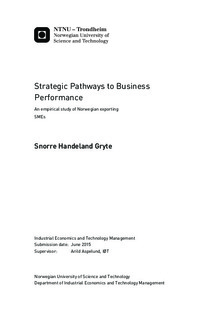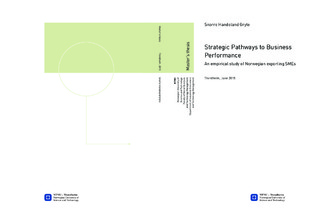| dc.description.abstract | Trade liberalization and increased openness between markets expose emerging market opportunities and impose increasingly tougher competition on firms participating in cross-border trade. A growing number of resource-constrained small and medium-sized enterprises are selling their goods and services in international markets, and have thus evolved into a significant constituent of the world economy. Hence, firm internationalization necessitates complex strategic processes bearing relatively high operational risk, and the successful employment of exporting strategies is becoming progressively important.
Exporting and innovation are widely recognized as two major sources of growth and profitability, and this thesis presents these performance-seeking strategies as vital strategic instruments of above-normal business outcomes. In particular, the following features are investigated; (1) which strategic elements are associated with exporting and innovation capabilities; (2) how is financial performance affected by the use of performance-seeking strategies.
A quantitative research strategy was applied to address the proposed relationships investigating a data sample consisting of 190 Norwegian exporting small and medium-sized enterprises from multiple industry sectors. The thesis attempts to empirically test and estimate the performance profiles of internationalized companies by employing multi-group structural equation modeling.
The study finds that attempts to improve innovation and exporting capabilities should be accompanied by an international orientation. Additionally, an organizational climate for initiative and commitment is essential in developing successful innovation capabilities, while management team diversity complements the adoption and implementation of successful exporting activities. The results also reveal that successful exporting is positively related to firm performance. However, the obtained findings challenge the validity of internal innovation capabilities as predictors of firm performance.
The present study provides significant implications for practitioners and theorist, and the practical and theoretical implications contribute to the knowledge of how strategic risk imposed by exporting activities should be managed in a small and highly specialized economy. Finally, the research illuminates essential determinants of firm performance, and suggests directions for future research in the field of international business and strategy. | |

